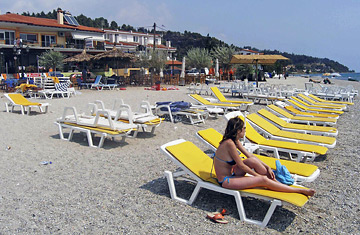
A beach at a tourist resort in Northern Greece.
In better times, Christos Kortzidis never skips a meal. Yet, for most of this month, the mild-mannered mayor of Hellenikon, a seaside suburb south of Athens, has sat squat in a rusting folding chair in his office, surviving on water and fruit juice. "Starvation," he says, "was my last resort in order to pressure authorities to save the [Greek] beaches from further exploitation." Elected on an independent ticket last October, Kortizidis has lobbied for years against the privatization of Athens' prime beachfront, urging the centre-right government to take on the nightclub owners and entrepreneurs whose leisure venues along the chic coastline block beachgoers from reaching the sandy shoreline without paying a fee.
Under the Greek constitution, the country's 10,000 miles of jagged coastline — among the longest in the world — must be freely accessible to the public. But today, that principle is widely ignored. Existing legislation, say legal experts, allows the state to manage the property, providing legal loopholes for seaside restaurants, nightclubs and hotels to operate along the coastline and effectively keep out the straying and non-paying public. "In my district alone," says Kortzidis, "20,000 residents haven't been able to walk to the beach for years, without paying a minimum seven euro [$9] entrance fee to some businessman. It's ludicrous! Who pays an entrance fee to enter his home?"
The commercialization of beach access is hardly unique to Greece — commercial operators are encroaching on beaches all around the Mediterranean. On the Tuscan and Ligurian coasts, for example, sun worshipers can be charged upwards of $25 a day for a chair and patch of sun, sunblock not included. And Mayor Kortzidis is not alone in fighting back: In recent weeks, Italian protesters have been walking directly through concession areas without paying to get to the beach, a 16-foot strip of which, under Italian law, must be open to all. In Greece, similar legislation also calls for 160 feet of open access space along the country's shoreline, a rule defied by most beachfront entrepreneurs who fence off the beach in front of their establishments and charge an entrance fee.
For Kortzidis the last straw was a violent showdown with a local nightclub owner in May. After a string of ill-fated appeals to the government to shut down illegal nightclubs and business ventures in Hellenikon, Kortizidis took action alone. He faced up against a team of local entrepreneurs, shutting down a sprawling go-cart business controlling swaths of sandy shoreline along Hellenikon. He then ordered a bulldozer to rip out the operation's fenced facade, and commanded a nightclub owner to pull the plug on a pay-beach venue exploiting another part of the Athens coastline, the Agios Kosmas beach. Within days of the notice, an incident occured in which two of Kortzidis' town hall officials claimed they were battered by the nightclub owner and his wife. The officials, the businessman and his wife have since been embroiled in legal suits. A trial is expected later this year. The confrontation sent shock waves across the nation. Harrowing images of the battered officials were splashed on covers of most national dailies, propelling Kortzidis to stage his hunger strike, the most dramatic step yet in what local media have dubbed "the battle for free beaches."
Backed by labour unions, political organizations and 15 other mayors in the greater Attica region, Kortzidis gained overnight celebrity status and won national support for his cause. Thousands of supporters poured onto the streets for a beachfront rally, as a nationwide debate resumed over the commericialization of beaches. Critics billed the mayor's protest an "extreme stunt," but that did not deter the once rotund Kortzidis, who fasted for 24 days and shed 16 pounds. He ended his water-and-fruit-juice protest last Sunday after assurances from the government that it would produce new legislation on the management of Greece's beaches. "The mayor's motives are understandble," Deputy Finance Minister Peter Doukas tells TIME. "We are trying, now, to right the wrongs of the past and bring order to this chaotic situation. The legislation we are preparing now will not only ensure but maximize the public's access to the coast." Judicial officials also vowed to review the licenses of four coastal clubs, and shut down the pay-to-enter facility at Agios Kosmas,
Today, a huge blue banner flies over the sprawling beach, reading "FREE FOR ALL." The grounds, though, are filthy, and the capital's beachgoers have gone missing. "Who wants an empty, unkept beach, with no service, no lifeguard and two sun-baked policemen sipping on iced coffee?" says Marios Kostaras, a local beachgoer. "A noble cause means nothing if there's no management plan to follow."
